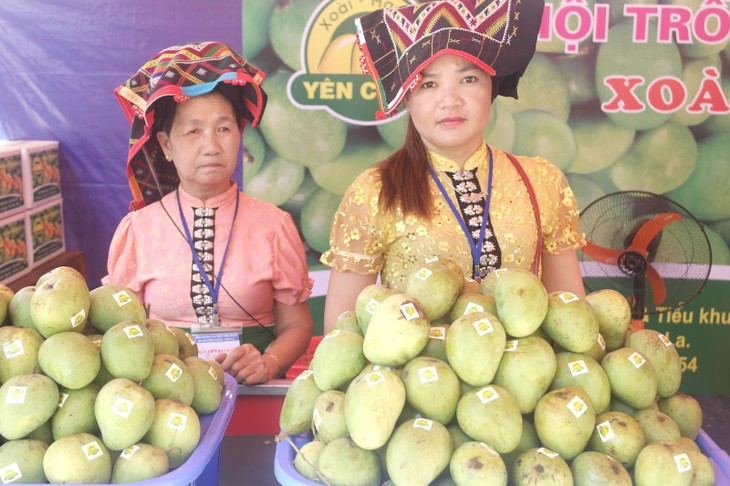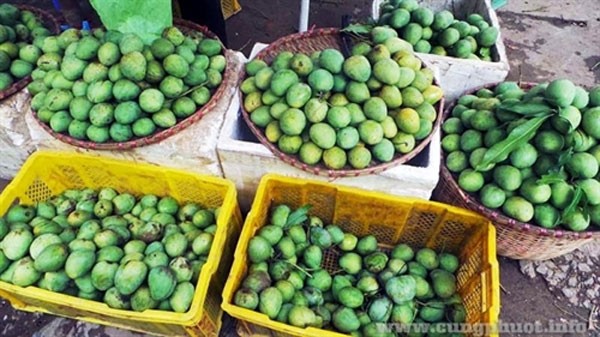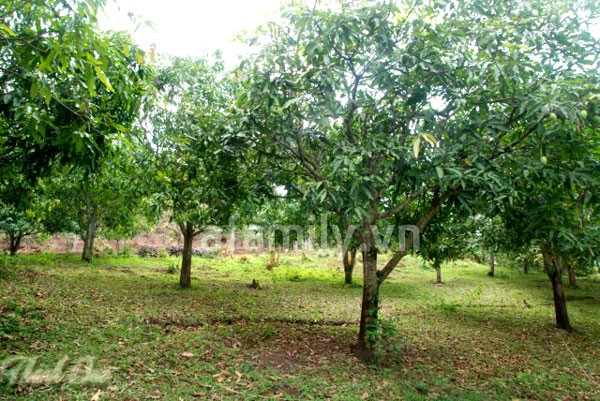(VOVworld) - The National Office of Intellectual Property of Vietnam has issued a certificate of geographic origin for Yen Chau mangoes in the three communes of Chieng Pan, Vieng Lan, and Sap Vat in Son La Province. This is the second type of mango in Vietnam to be licensed with a certificate of geographic origin. This news has reassured Son La farmers as they grow mango trees, increase their incomes, and build a new-style rural area.
 |
From April to June, Yen Chau mangos are sold along the Highway 6.
(Photo: xoaiyenchau.blogspot.com) |
In the past, Lo Van Tieng’s family in Bat Hamlet in Sap Vat Commune mainly grew corn, cassava, and a few fruit trees. Mango trees accounted for a modest acreage. In the past five years, when mangoes have been sold at higher prices, Tieng’s family has expanded the mango cultivation area. Thanks to support from agronomists in farming techniques, Tieng now has more than 8,000 square meters for mango cultivation, earning tens of thousands of USD a year.
“Growing mangoes has brought in a higher income, but requires less effort than growing corn. At the moment, a kilo of corn is sold at about eighteen cents while the price of a kilo of mangoes is four to five times higher,” said Tieng.
Yen Chau mangoes are smaller than the mangoes from other regions of Vietnam but its seed is small and has a distinctive fragrance and taste.
 |
| Local fruit: Yen Chau mangoes offer sweet delicacy. (Photo: vietnamnet.vn) |
Tran Dang Ninh, a tourist from Quang Ninh Province, said: “Yen Chau mangoes are very sweet, unlike other kinds of mangoes in Vietnam. The mangoes here are harvested as soon as they begin to ripen, ensuring their quality. No chemical substance is used for making the fruit to ripen unnaturally.”
The Ministry of Agriculture and Rural Development has put Yen Chau mangoes on its list of rare genetic plant resources that need to be preserved and developed. This species is the only type native to northern Vietnam listed by the UN Food and Agriculture Organization (FAO) as in need of preservation and development.
Recently, the National Office of Intellectual Property of Vietnam has granted a certificate of geographical origin to Yen Chau mangoes together with Hoa Loc mangoes in the Mekong Delta Province of Tien Giang.
Hoang Van Keo, Vice President of Yen Chau’s Mango Plantation and Consumption Association, told VOV: “Local farmers are very glad because this year their fruits are selling at higher prices than last year. In 2015 a kilo of mangoes was 22 cents, but this year the price has almost doubled. If mango growers work with us closely, their productivity will increase.”
Yen Chau now has more than 400 hectares of mango cultivation areas mainly in the three communes of Chieng Pan, Vieng Lan, and Sap Vat.
 |
| Mango gardens in Yen Chau are attractive destinations for tourists. (Photo: afamily.vn) |
The mango is a strong cultivar, has fewer pestilent insects, and takes less effort to take care of. Luong Trung Hieu, Vice Chairman of Yen Chau People’s Committee, said in the future the district would coordinate with Hanoi’s Institute for Vegetable and Fruit Studies to research outstanding parent trees to preserve genetic resources and the cultivation of this species of mango.
“The district authorities will further improve the performance of Yen Chau’s Mango Plantation and Consumption Association. We will pay more attention to the relations between mango growers, sellers, and other farmers, and set up production teams in the communes concerned,” Hieu gave more details.
With their brand recognized, Yen Chau farmers are trying their best to preserve the prestige and quality of the specialty helping them to earn a stable income and improve local socio-economic conditions.